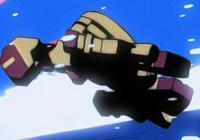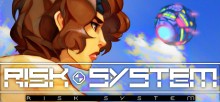Risk System (PC) Review
By Gabriel Jones  08.07.2019
08.07.2019

Sometime far in the future, advances in matter replication have created a Utopian society. With the breakthrough technology made possible by a Dimensional Gate, mankind entered a new era of prosperity. Unfortunately, it didn't last. Parasites infiltrated the Gate, disguising their selves as the matter that's used to build these incredible machines. Before long, all of mankind's weapons were turned against them. It gets worse. By emitting a strange energy, the parasites started to take control of humans. Only one hope remains. Alys is a skilled pilot who is immune to parasitic control, and she's about to take the fight to the menace that threatens mankind's existence.
The shmup genre, as rigid and unforgiving as it tends to be, is still open to interpretation. Developers from all over the world have and will continue to share their vision of what it means to be the last hope against an unbelievable force. Some, like Risk System, set themselves apart by employing numerous design-decisions. The final result is an STG that adheres to the atypical. As always, players must pilot an experimental craft through multiple stages, each of which are filled with the usual menagerie of minions and bosses. However, if one expects to survive, let alone achieve a high score, then they're going to have to understand that the old rules don't apply here.
Alys's ship, the RSK-9, is equipped to handle any situation. With forward-firing vulcan cannons, a rechargeable shield, and jet boosters for initiating tactical rolls, the average sortie shouldn't be too much trouble. Considering the odds, surviving this mission will require a weapon of unparalleled power. Enter the barrier breaker. By flying close to enemy fire, the ship will start to build energy. Once it hits maximum, the pilot can opt to fire off the barrier breaker, which does immense damage to everything onscreen. This can also destroy adversaries that are far away.

Once you get the hang of the basics, then it's time to tackle the more advanced techniques. While performing a barrel-roll, the ship's cannons increase in strength. This also occurs when the RSK-9 is grazing enemy projectiles. Staying as close as possible to death serves a second purpose. While grazing, destroyed foes will drop shield-restoring energy units. If the shields are full, then those units are converted into chain bonuses. As far as scoring systems go, this one is pretty simple to understand. All you have to do is get the chain as high as possible, and never take any damage. Of course, when it comes to shmups, understanding is always the easy part.
Risk System is tough, but in a way that isn't immediately noticeable. Indeed, when viewing screenshots or superplay videos, this game looks less intense than others of its ilk. Actually playing it is an entirely different story. The RSK-9 is unique in that it obeys Newton's first law of motion. In other words, this ship is subject to inertia. Out of the hundreds of STGs this critic has played, the number that featured some form of inertia could be counted on one hand. To purposefully make a STG that adheres to this mechanic… it's unfathomable. For anyone who has grown accustomed to the standard approach, a serious effort is required in order to get the hang of this.

Since the ship doesn't immediately stop and change directions, it's on the player to compensate by accurately predicting enemy patterns and attacks. One can't merely charge into every situation and flawlessly graze against oncoming threats. There are some interesting aspects to this mechanic, most notably the fact that if the d-pad is pressed in the opposite direction of a barrel-roll, it causes the ship to remain close to its current position, but with the benefit of an increased fire-rate. Often-times though, the first few attempts at this game are going to involve a lot of suffering. Some may discover their confidence has shaken, and they're much less likely to pursue risky strategies.
Unfortunately, even those who play it safe will struggle to reach the end. While it is possible to stumble through the bulk of the stage, the bosses are all serious roadblocks. As mentioned earlier, enemies destroyed while grazing will drop shield-repairing units. Basically, even if the ship is taking a bunch of hits, it can still recover from them fairly easily. Avoid becoming dependent on this feature, because it isn't available during boss-fights. That right there is the kicker. If Alys is to survive the battle, she'll have to go from making several mistakes, to just one or two. In a couple rare cases, she has to be perfect, due to certain bosses having instant-death attacks.

Though there are checkpoints at the beginning of every stage, and before every boss fight, headaches are still inevitable. This is mainly because the score is reset to zero, every time Alys dies to a boss. In other words, if the player wants the best ranks, and a shot at the good ending, they're required to start the stage over. Eventually they'll reach a point where they can coast through everything else, but continually mess up at the boss. The level of difficulty isn't uniform enough to adequately prepare them for these all-or-nothing battles. Perhaps, if it were left up to this critic, there would be no instant-death attacks. Furthermore, a recovery item would drop after the boss has lost half its health.
On the other hand, maybe failure is a necessity. If everything went the player's way, then there wouldn't be any struggles to overcome. Besides, the developer was kind enough to allow for stages to be restarted without penalizing the score. Progress is also saved in-between stages, so one could always take a break and come back. Given enough time, it's possible to adjust to the RSK-9 and its off-kilter controls. However, it's just as likely that some, such as this critic for example, simply won't be able to connect.

Cubed3 Rating
Good
Risk System is a hard game to recommend on a whim, yet also pretty remarkable. Players can't expect to just jump in and blast everything in sight. First they have to get a handle on controlling their own ship, which is an awfully tall hurdle in itself. The bosses are also frustrating, especially when playing for score. Altogether, this is an anti-establishment STG. It features a learning curve of its very own, one that quite a few may never be able to appreciate.

![]() 6/10
6/10
![]() 0
(0 Votes)
0
(0 Votes)
 Out now
Out now  Out now
Out now  Out now
Out now  Out now
Out now Comments
Comments are currently disabled

 Sign In
Sign In Game Details
Game Details Subscribe to this topic
Subscribe to this topic Features
Features







 Top
Top

